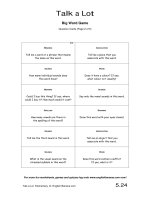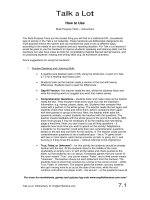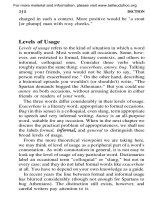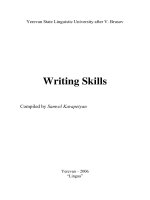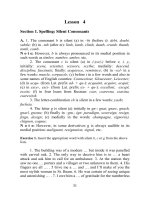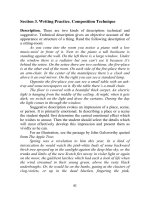Tài liệu Developing writting skills 2 part 9 docx
Bạn đang xem bản rút gọn của tài liệu. Xem và tải ngay bản đầy đủ của tài liệu tại đây (122.44 KB, 10 trang )
80
could be done about it. Slavery and peonage were taken for granted.
Not until science became prominent did slavery come to be
recognized as a dreadful wrong, to be abolished. It was the scientist,
supposedly cold and concerned with things rather than ideals, who
brought this about. His investigations made possible the harnessing
of the energy of the inanimate world. With steam, electricity and
radio beams to do our work for us, there was less need for the
comparatively weak and fumbling human muscle – and slavery
began to vanish.
9. It is also a fact that, before modern technology, the full flower
of art and human intellect was reserved for the few. It was the
technical advances of printing that scattered books widely, made
universal literacy practical. It was the movies, radio, the record
player and television that brought many of the marvels of mankind to
even the poorest.
10. Yes, science has helped create problems, too – serious ones.
And we must labor to solve them – in the only way history tells us
problems have been solved: by science. If we were to turn away now,
if a noble young generation abandoned the mainstream of an
industry, what would happen? Without the machinery of that
industry, we would inevitably drift back to slavery.
11. In these days of urban decay and energy crisis, there is a
constant longing to return to the land and flee back to a simpler way
of life. But it can’t be done. We have a tiger by the tail
1
and we can’t
go home again
2
. We never could.
12. When mankind learned how to make use of fire some 50,000
years ago, it meant protection against predators, and more and better
food. It also meant that man could venture out of the tropics into
colder climates. Do you suppose this didn’t bring problems? When
the fire went out in the cave on a winter night and could not be
relighted, there was the danger of freezing. Or the smoke would ruin
one’s lungs.
13. Why not give up fire, then, go back to the tropics and the
simpler, carefree ways? Ah, one could not. Extending his range, man
had increased his numbers. Returnees would find the tropics full;
1
“a tiger by the tail” = “in charge of a powerful force”
2
“can’t go home again” = “can’t return to a simpler life”
81
there would be a catastrophic struggle for the smaller supply of food.
So, having once learned to use fire, people either endured its
discomforts – or did away with them by further technological
advance. They learned better ways of making fire, heating dwelling
places, handling smoke.
14. No fundamental technological advance has ever been given up
willingly by any society. There has been no way to do it.
15. About 8000 B.C., mankind invented agriculture. Again it made
possible an increase in numbers. People had never eaten so well, but
it meant they had to give up the free, nomadic life and remain bound
to the soil. It meant hard labor. It meant banding together to fight off
surrounding tribes who, still food gathering, might help themselves
to your crops. It also meant the risk of crop failures.
16. Where irrigation was introduced to make harvest more
dependable, it meant the formation of a large political unit, the social
tyranny of a king, an aristocracy, a priesthood. And, even if the land
grew prosperous and populous, any infectious disease that got started
ran through the crowded population like wildfire.
17. Why not, then, go back to the wilder, freer ways of hunting and
food gathering? Wouldn’t that mean less work and worry, less war,
less pestilence?
18. But you can’t! Abandon agriculture and, out of every 10,000
people, only 100 survive. No, the problems to which agriculture gave
rise could be solved only by moving forward with additional
advances in technology – the use of oxen in place of men, horses in
place of oxen, crop rotation, fertilizer, etc.
19. So it is now with our industrial age, which has once again
increased man’s numbers and his range – and brought new problems.
If there is a shortage of gasoline, can’t we in a pinch abandon our
automobiles and go back to horse-and-wagon? Give up our oil
furnace for the fireplace? Give up electric lights and use candles?
20. No, we can’t. There are no longer enough horses to move us
about, or enough wood to warm us, or enough candles to light our
way. Besides, if we try it for long, we will quickly find that the
simple life just won’t do.
21. In 1800, when the earth was still supported almost entirely by
nonindustrial methods, the population of the planet was 900 million.
Now it is pushing four billion. Where does the food come from to
82
support the extra three billion? It comes from the industrialization of
the farm: from the use of high-energy machinery to plow and seed
the weed and reap. It comes from fertilizers and insecticides
produced by sophisticated high-energy chemical factories.
22. We can’t abandon industrialization, if only because our food
supply depends on it. You can talk about “natural” food all you want,
but if everyone decided to grow food without chemical fertilizers or
insecticides or machinery, it would mean that only one quarter of the
world population could be fed.
23. Can we abandon some of our industrial technology and hold
onto the rest? That would be very difficult, since it all hangs
together.
24. We can save, conserve, cut out waste, but what we have we
must keep. The only solution, as always in the history of mankind, is
to solve problems by still further advances in technology.
Explain what is meant by:
1. …the tendency is to exert caution before committing the world
to something that may not be reversible.
2. The trouble is, it’s not always easy to tell what the side effects
will be.
3. A double-edged sword of good and evil has hung over human
technology from the beginning.
4. For the population explosion today is caused not by any rise in
average birth rate but by the precipitous drop – thanks to
medicine – in the death rate.
5. Or does it mean we should use science to correct the possibly
deleterious side effect, devise methods that would make it
simpler to reduce the birth rate and keep it matching the falling
death rate?
6. It was the scientist, supposedly cold and concerned with things
rather than ideals, who brought this about.
7. His investigations made possible the harnessing of the energy of
the inanimate world.
83
QUESTIONS FOR STUDY AND DISCUSSION
1. What is the main point of the first six paragraphs? Which
sentence states it best?
2. What are the four examples Asimov uses in the first six
paragraphs to prove his main point?
3. What does Asimov think of the idea of returning to a simpler
life? Why does he find it
necessary to give the realistic
picture of life before technology and to stress the role of
science in the abolition of slavery?
4. Find the paragraph where the main idea of the essay is
stated. Does the essay have a stated thesis sentence?
5. How does the discussion of the invention of fire and
agriculture help to prove Asimov’s main point? Do you
observe any definite order in the way he developed and
arranged the examples?
6. Why does the author put forward so many questions in his
essay? Comment on their role.
7. How can you account for the repetition of the short sentence
“No, we/you/one can’t” as an answer to most of the
questions raised in the essay?
8. Into how many parts would you divide the essay? Why?
9. Which methods of development does Asimov employ in
each part? Account for his choice. Account for the reasons of
his choice?
10. Is the author’s support effective? Are you convinced? Could
he have used any other kinds of support that would have
been as effective or more effective?
11. Can you find any weak points in his argument? How would
you argue against Asimov?
84
EXPAND YOUR VOCABULARY
Match the words in Column A with their definitions in Column B
A B
1) reversible a) to invent sth new or a new
way of doing sth
2) to brutalize b) make sb worried or anxious
3) side effects c) to control and use the force
or strength of sth to produce
power or to achieve sth
4) to devise d) a substance added to soil to
make plants grow more
successfully
5) to harness e) (of a machine, system, etc.)
clever and complicated in
the way that it works or is
presented
6) predator f) to treat sb in a cruel or
violent way
7) fertilizer g) (of a process, an action or a
disease) that can be changed
so that sth returns to its
original state or situation
8) sophisticated h) an animal that kills and eats
other animals
9) to hang over (sb) i) an extra and usually bad
effect that a drug has on, in
addition to curing illness or
pain
YOUR TURN
1. Discuss the advantages and disadvantages of progress in an
argumentative essay. State your own point clearly and provide
sufficient support for it.
85
2. “The human race’s prospects of survival were considerably better
when we were defenceless against tigers than they are today when
we have become defenceless against ourselves”(Arnold Toynbee).
Oppose or support this statement in an argumentative essay. Think of
an appropriate method or methods of development and arrangement
of the information.
3. Imagine that you are living in 2080 A.D. Write an essay entitled
“The Twenty-first century”.
Other Possible Topics
• The twentieth century has often been called “the age of the
common man”. What is your view?
• Account for the rapid growth of the world population in the last
hundred years and discuss some of the main problems this will
give rise to.
• “Everything that enlarges the sphere of human powers, that
shows man he can do what he thought he could not do, is
valuable.”( Dr Samuel Johnson)
• “Automation is likely to create more problems than ever before”.
Note: A writer has more than one pattern of arranging the ideas
and details in a paragraph or an essay.
From General to Specific
Starting with a general statement and supporting it with a specific
one is a common way to organize a paragraph or an essay.
From Specific to General
Beginning with specific details and moving toward a general
conclusion (the topic sentence) that relates to these details is another
way to arrange information.
86
By Order of Importance
Order of importance, sometimes called climatic order, presents
examples or points according to how important they are. Most
important might mean strongest; it might also mean most common.
Usually the most important point is given last, though not always.
The pro-con essay generally uses order of importance. The thesis is
given; then examples are presented and points are made, with the
strongest point last.
From Question to Answer
A good way to develop a paragraph/an essay is with an interesting
question. You can then devote the rest of your writing to details that
develop an effective answer to that question.
From Problem to Solution
Organizing a paragraph/an essay by stating a problem and explaining
how to solve it in the sentences that follow is much like asking a
question and answering it. It is especially effective when you are
explaining a process or analyzing causes and effects. But it can be
used with other methods of development as well.
87
TEXT 3
Reach Out and Annoy Someone
By Jonathan Rowe
Cell phones seem almost everywhere these days—in schools, offices,
airports, restaurants, cars, buses, and on the street. How do all these
cell phones affect the quality of public life? Jonathan Rowe believes
that increasing reliance on cell phones has had negative effects on
both the users of these cell phones and the people who are near
them. If you enjoy the use of your cell phone, you may think his
evaluation is too one-sided. But as you prepare to read, understand
that Rowe chose to focus on the social consequences of cell phone
use—not the convenience of such phones for the individuals who use
them.
1. In the 1990s, in the midst of the high-tech boom, I spent a lot of
time in a coffee shop in the theater district in San Francisco. It was
near Union Square, the tourist hub, and I observed a scene play out
there time and time again. Mom is enjoying her coffee. The kids are
picking at their muffins, feet dangling from their chairs. And there’s
Dad, pulled back slightly from the table, talking into his cell phone.
2. I would watch the kids’ faces, vacant and a little forlorn, and
wonder what happens to kids whose parents aren’t there even when
they are. How can we expect kids to pay attention if we are too busy
88
to pay attention to them? Peter Breggin, the psychiatrist, says much
“attention deficit disorder” is really “dad deficit disorder.” Maybe he
is right. It was supposed to be a “communication revolution,” and yet
here, in the technological epicenter, the members of this family were
avoiding one another’s eyes.
3. With technology in particular, we discuss the implications only
within a narrow bandwidth of human concern. Is there a health risk?
Might the thing cause cancer? That’s about it with cell phones,
computers, genetic engineering, and a host of other new
developments.
4. I don’t discount the significance of cancer. But there is
something missing from a discussion that can’t get beyond the most
literal and utilitarian concerns. Actually, some of the problems with
cell phones aren’t at all squishy or abstract. If you have been clipped
by a car tooling around the corner while the driver sits gabbing, cell
phone in hand, then you are aware of this. The big problem, of
course, is the noise. For sheer intrusiveness, cell phones rank with
mega-amp car stereos and political commercials, and they are harder
to escape.
5. We all know the drill. First the endearing beep, which is like an
alarm-clock going off at 5:30 a.m. Then people shout into the things,
as though they are talking across the Cross Bronx Expressway. It’s
become a regular feature at movies and ball games, restaurants and
parks. They represent more than mere annoyances. Cell phones
affect life in ways that are, I suspect, beyond the capacity of the
empirical mind to grasp.
6. Travel is an example. Thomas Carlyle
1
once advised Anthony
Trollope
2
to use travel as a time to “sit still and label his thoughts.”
For centuries, travel played this quiet role. I used to look forward to
Amtrak
3
rides almost as a sanctuary. They provided precious hours
in which to work or read or simply muse without the interruptions of
the telephone and office. But now, cell phones have caught up with
1
Thomas Carlyle: Scottish historian and social critic (1795-1881) who
influenced many important thinkers in the nineteenth century.
2
Anthony Trollope: British novelist (1815-1882) best known for
“Barchester Towers” and “The Warden”.
3
Amtrak is a company which runs passenger trains in the US.
89
me. They have turned Amtrak into a horizontal telephone booth; on a
recent trip to New York my wife and I were besieged by cell phones
and their cousins, high-powered Walkmen, literally on all sides. The
trip, which used to be a pleasure, has become one long headache.
7. I wrote the president of Amtrak to tell him this. I tried to be
constructive. Why not provide “Quiet Cars” the way they provided
No Smoking cars when smoking first became an issue? Amtrak
could give riders a choice, which is what America is supposed to be
about—and which Amtrak’s main competitors, the airlines, cannot
do. This seemed like a no-lose proposition. The yakkers could yak,
others could enjoy the quiet, and Amtrak could have a PR coup. The
argument seemed pretty convincing, but the answer turned the issue
upside down. “We hesitate to restrict users of cell phones,” it said,
“especially since many customers find train travel an ideal way to get
work done.” But that is exactly why cell phones should be
restricted—because many travelers are trying to get work done. For
one thing, the notion that people are busily working on cell phones is
New Economy hype. I have been a coerced eavesdropper on more
conversations than I could count. I have listened to executives gab
about their shopping hauls and weekend conquests. I once had to
endure, between Philadelphia and New York, an extended brag from
an associate sports agent regarding the important people he was
meeting. It is not often that I hear anyone actually discussing work.
8. But more importantly, consider the assumption here. We have
two people who arguably are trying to get some work done. There is
a cell phone user, who wants to make noise. And there’s myself (and
probably numerous others), who would appreciate a little quiet. Why
does the noise automatically take precedence over the quiet?
9. This is where the trail starts to get warm, I think. There is
something about technology that enables it to take the front seat in
any situation it enters; that is to say, there is something in ourselves
that seeks to give it this seat. A Maine essayist by the name of John
Gould once noted this about the ordinary telephone. He was up on
the roof one day when his wife called to him about something.
“Later,” he said, “Can’t you see I’m working?” Later came, and this
time the phone rang. Gould scrambled down the ladder in a frantic
attempt to get to that phone.
